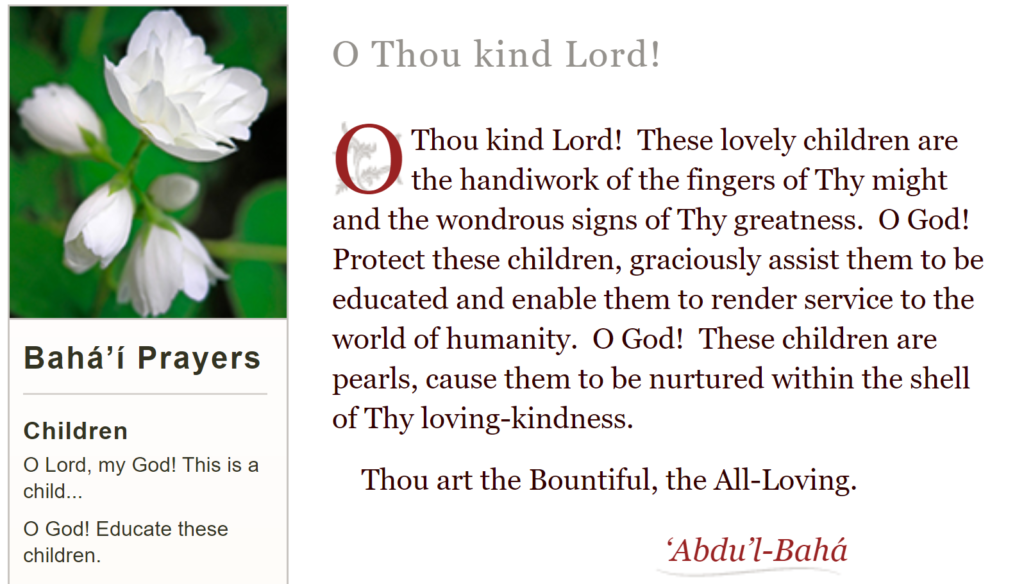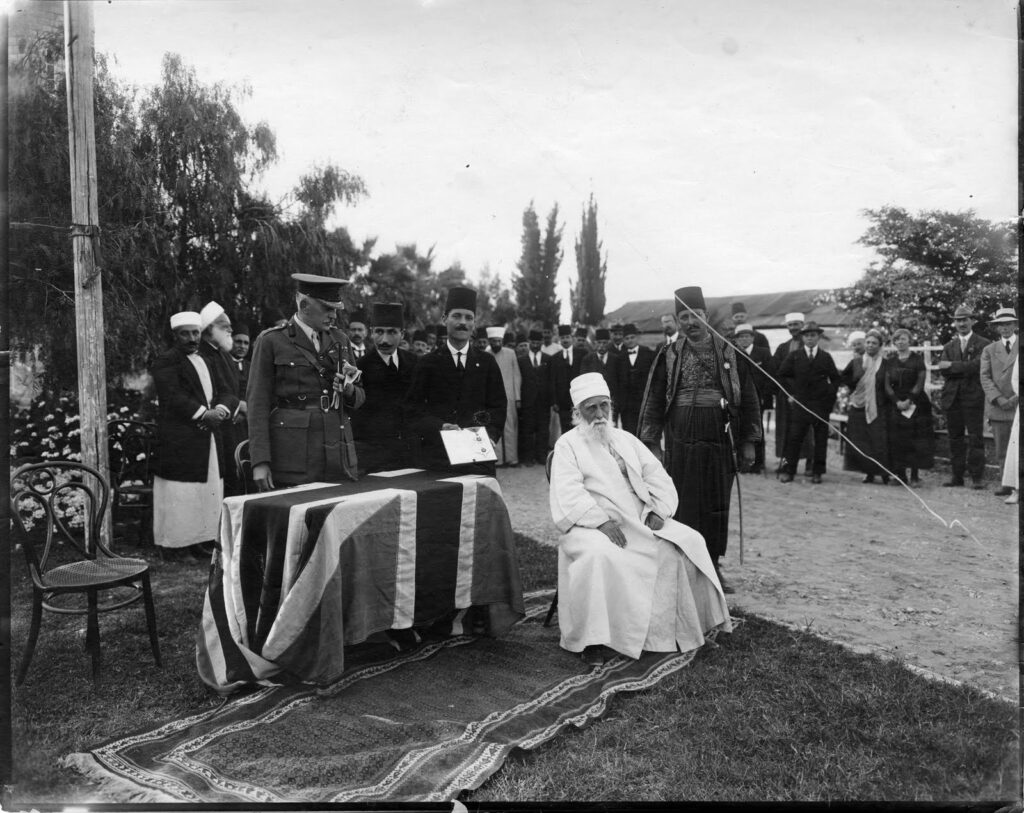
‘Abdu’l-Baha is the perfect example of service.
When we serve our fellow human beings we are serving God.
There are many ways to serve, for example we can help people in need, visit the sick, share what we learn with others. We should strive to serve all people, whether rich or poor, friends or strangers.
‘Abdu’l-Baha’s name means “Servant of God”. He did not think about his own comfort. He did not seek to become wealthy or powerful. He never wanted any titles or recognition. His only desire was to serve God and humanity.
That is what we are all trying to achieve. What greater joy is there, than to bring joy to another soul. What greater honour, than to be a true servant of God and humanity.
If we are to serve God and humanity, effort is required. We must be diligent and hard working, like trees which give delicious fruit for the enjoyment of all.
God promises to assist our efforts. So we rise every day and turn our hearts to Him in prayer, and then set out, confident, that His love surrounds us.
We can make the world better. We can make it an earthly paradise.
And at the end of the day we think about what we have done, and thank God for his assistance, and we know that we will try even harder the next day.

To Memorise
Waste not your time in idleness and sloth. Occupy yourselves with that which profiteth yourselves and others.
‘Abdu’l-Baha


A story, a song, and another story:
To Serve God
Lua Getsinger, one of the early Bahá’is of America, tells of an experience she had in Akká. She had made the pilgrimage to the prison-city to see ‘Abdu’l-Bahá. One day He said to her that He was too busy today to call upon a friend of His who was very poor and sick. He wished Lua to go in His place. He told her to take food to the sick man and care for him as He had been doing.
Lua learned the address and immediately went to do as ‘Abdu’l-Bahá had asked. She felt proud that ‘Abdu’l-Bahá had trusted her with some of His own work. But soon she returned to ‘Abdu’l-Bahá in a state of excitement. “Master,” she exclaimed, “You sent me to a very terrible place! I almost fainted from the awful smell, the dirty rooms, the degrading condition of that man and his house. I left quickly before I could catch some terrible disease.”
Sadly and sternly, ‘Abdu’l-Bahá gazed at her. If she wanted to serve God, He told her, she would have to serve her fellow man, because in every person she should see the image and likeness of God. Then He told her to go back to the man’s house. If the house was dirty, she should clean it. If the man was dirty, she should bathe him. If he was hungry, she should feed him. He asked her not to come back until all of this was done. ‘Abdu’l-Bahá has done these things many times for this man, and he told Lua Getsinger that she should be able to do them once. This is how ‘Abdu’l-Bahá taught Lua to serve her fellow man.
Strive (song)
To Serve Others
There once was a very proud man who did not understand the Station of ‘Abdu’l-Bahá. One day, he approached the Master in the street and said, “So, You are called the Servant of God.” ‘Abdu’l-Bahá replied that, indeed, that was His name. The name ‘Abdu’l-Bahá means “Servant of Bahá” or Servant of God.
“Well,” said the man proudly, “I am Moses.” Now, the man was referring to the Prophet of God, Moses, and it was not really his name at all. Moses was one of the Messengers of God that came long before Bahá’u’lláh. The man was trying to annoy ‘Abdu’l-Bahá, but the Master did not respond to his jest. Instead, He told the man to meet Him the next morning at the same spot on the street, and they would go together and serve the people like the great Moses had done.
The man agreed, and the next day from morning to evening he accompanied the Master as He visited the sick and the suffering, served the needy and met with the people who were thirsty to receive His love and His wise counsel. By evening, the man who called himself Moses was extremely tired. Yet, he would not let go of his pride, and when ‘Abdu’l-Bahá asked him to accompany Him the next day, he accepted.
Again by the evening of the second day the man was exhausted, but he accepted to accompany ‘Abdu’l-Bahá for yet another day. On the third day when they returned from their arduous work, the man could not bear the thought of working so hard, not even for another minute. He had learned his lesson and had caught a glimpse of ‘Abdu’l-Bahá’s greatness. So as they went to part ways, and before ‘Abdu’l-Bahá could invite him for another day of work, the man said with great humility: “ ‘Abdu’l-Bahá, tomorrow morning I will no longer be Moses.”
Look at me, follow me (‘Abdu’l-Baha)
It’s Time for Service – Joe Crone
https://www.dropbox.com/s/r6je3rkygnoi3qg/03%20It%27s%20Time%20For%20Service.mp3?dl=0
Its time for service
To wipe the table
To use the vacuum
If I’m able
I’ll clean up my room
And make up my bed
I’ll make my deeds speak
Just like the Master said
Oh, I’m working for the Cause of God x4
Singing La la la la…
It’s time to read the Word
It’s time to say the prayers
It’s time to sing the songs
And I’ll sing them anywhere
I will use my gifts
And I will dance my dance
I know I can’t go wrong
If I just take a chance
Oh, I’m working for the Cause of God x 4
Singing La la la la…
Oh, I’m working for the Cause of God x 4
Singing La la la la…
Joe Crone, from “It Takes A Village”
